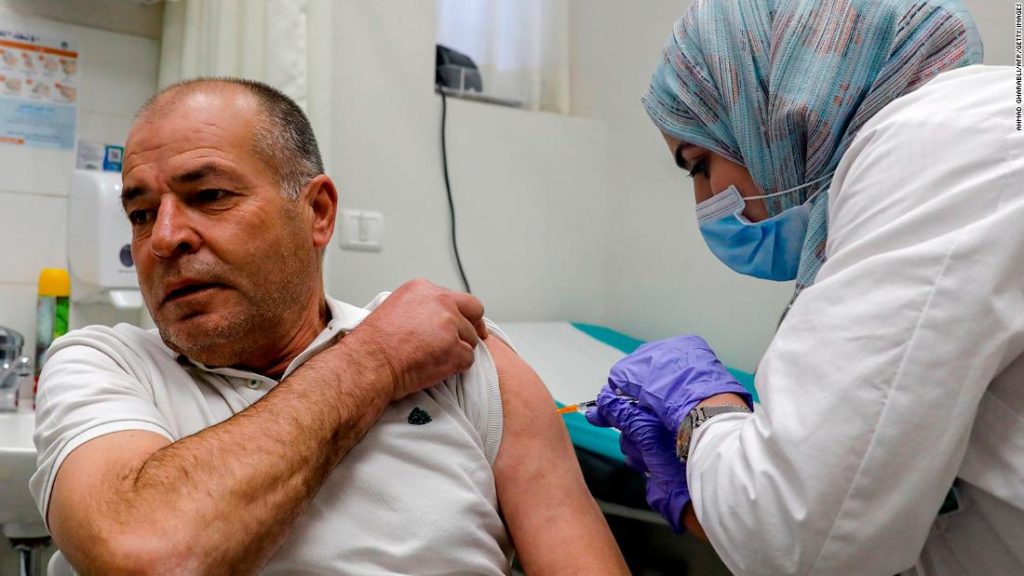Both are Palestinian residents of Kafr ‘Aqab, a finger of territory that under Israeli law is part of greater Jerusalem, but under international law is considered illegally annexed territory, following its capture from Jordan in 1967.
It’s also walled off from Jerusalem by Israel’s gigantic concrete security wall. Jewish Israelis rarely come here, except in uniform to conduct military raids.
Mahmoud Oudeh, like thousands of other residents of the town, has a Palestinian identity document. His friend Anan abu Aishe has an Israeli ID, which defines him as a permanent resident of east Jerusalem. This entitles him to join Israel’s world-leading vaccination campaign, which is on course to meet the government’s target of inoculating the entire country by the end of March.
But at least 4.5 million Palestinians living on the West Bank and in Gaza are being left behind. So far none have had the injections, and most are unlikely to get them any time soon — because there is no Covid-19 vaccination campaign in the Palestinian territories.
So, if Anan gets the vaccine and continues alongside his friend, slicing and selling meat from the goat and cow carcasses swinging from hooks in the shop, he says he’d feel guilty.
“Half of the people here cannot take it so I’m also not going to take it, why would I take it when they cannot? I won’t,” he told CNN.
“It’s racist,” Mahmoud added.
According to United Nations experts, a policy of immunization that differentiates between those with Israeli IDs, and those without, is “unacceptable.”
The UN expert report says that Israel is the occupying power in and over Gaza and the West Bank, and has been since 1967, and is thereby ultimately responsible for the healthcare of those living under occupation.
According to the experts’ report, published by the UN’s Office High Commissioner for Human Rights, Israel should extend its vaccination campaign to all Palestinians in Gaza and the West Bank.
The experts also said: “4.5 million Palestinians will remain unprotected and exposed to Covid-19, while Israeli citizens living near and among them — including the Israeli settler population — will be vaccinated. Morally and legally, this differential access to necessary health care in the midst of the worst global health crisis in a century is unacceptable.”
But as Israel’s vaccination campaign climbs past 20% of the Israeli population (including east Jerusalem residents), this is not a characterization that Israeli health minister Yuli Edelstein accepts.
“Our calculation was based on Israeli citizens. If we’ll get to the situation where everyone in the country who wants to be vaccinated is vaccinated, we will be more than ready to share the vaccines with our neighbors,” Edelstein told CNN.
“At this stage we are talking about Israeli citizens … I haven’t heard of any obligation of Israel to pay for the vaccines for someone else.”
Israel’s government points to the Oslo accords, signed in the mid-1990s with the Palestine Liberation Organization, which led to the creation of the Palestinian Authority (PA). Included in the first of those agreements is a clause that hands responsibility to the PA for the health of all Palestinians under its civil administration.
Experts admit it is not a straightforward task trying to navigate between the responsibilities assigned by Oslo, which was not a final status agreement, and the duties laid out under the Geneva Conventions.
In his interview with CNN, Edelstein couched the decision in terms of interests rather than obligations.
“At this stage we are not supplying vaccines, but we do understand that it is in Israel’s interest to make sure we don’t get into a situation where we are vaccinated and then out of this trouble, and on the Palestinian side there is another surge in numbers,” added Edelstein.
The PA Health Minister, Dr. Mai Al-Kaileh, says they expect to get hold of the Covid-19 vaccine by the end of March, but that there is no specific date set yet for their arrival. The Ministry says it has contracted with four companies producing the vaccine. These vaccines will cover 70% of the Palestinian population and the World Health Organization will provide the Ministry with 20%,” the PA said in a January 9 statement.
In Ramallah’s Public Central Hospital, medics work around the clock treating coronavirus patients in a Covid-only intensive care unit. Just as in many other hospitals around the world, non-specialist staff have been drafted in to help cope with the pandemic. But after a prolonged lockdown, admissions are falling and on the day CNN visits, the ICU unit isn’t full.
Dr. Wafa Shihadeh, a resident general surgeon, has been working on the Covid-19 wards for months. He says he’s seen many of his colleagues succumb to infection and spread it to their families.
“We are starting to feel depressed because we’re not getting the vaccines here in the Palestinian territories,” he said. “And on the other side of the border, Israel … I think as of three days ago about 1,600,000 people had been vaccinated, and here in Palestine the number of vaccinated people is zero.”
Abeer Salman contributed to this report.
You may also like
-
UK coronavirus variant has been reported in 86 countries, WHO says
-
NASA technology can help save whale sharks says Australian marine biologist and ECOCEAN founder, Brad Norman
-
California Twentynine Palms: Explosives are missing from the nation’s largest Marine Corps base and an investigation is underway
-
Trump unhappy with his impeachment attorney’s performance, sources say
-
Lunar New Year 2021: Ushering in the Year of the Ox

